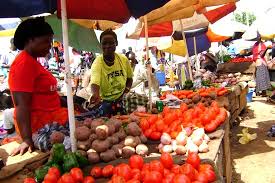Mr Oludayo Obasanjo, Executive Director, Marketing and Development, Obasanjo Farms Nigeria Ltd., has called for concerted efforts to promote Nigerian foods globally.
Obasanjo said in Lagos on Friday that this could be achieved by highlighting unique qualities and health benefits of Nigerian food.
According to him, repositioning Nigerian foods for global accessibility requires patriotism from government, individuals and stakeholders.
He said that Nigeria, with a population of more than 200 million people was a desired destination for many manufacturers in the world.
He also said that Nigeria must leverage this strength to improve local production to meet demands for food as well as exports to other countries.
“Nigerian foods are diverse and rich with a variety of traditional dishes that are both healthy and delicious.
“However, Nigerian foods are not well known globally like the Chinese or Indian foods.
“Nigeria has a large population in the diaspora, our exports to the United States and Europe can begin with Nigerians and other Africans as target consumers,” he said.
Obasanjo said that it was sad that Nigeria had not been able to meet local demand for food in its various processing stages, adding that the country still depended majorly on importation of ultra-processed food.
He said that it was also saddening that the little exports the country managed to send out were being rejected.
Obasanjo said that recently the National Agency for Food and Drug Administration and Control (NAFDAC) said that more than 70 per cent of food exported from Nigeria were rejected abroad.
He said that was a great loss considering the amount of money spent on exporting those foods.
Obasanjo urged the food sector to wake up and be more efficient, noting that even the minimally processed foods such as chicken were still being smuggled into the country.
“This has significantly impacted the local industries negatively and consequently its poor per capital income and low Gross Domestic Product (GDP).
“It is important to mention that most of these imported foods fail basic health and nutritional tests.
“Most imported processed foods have been found to be predisposed to health challenges such as cancer, heart diseases, hypertension and high cholesterol particularly the low density lipoprotein among others,” Obasanjo said.
He said that institutions like the Nigerian Institute of Food Science and Technology (NIFST) must collaborate with government agencies such as NAFDAC and other bodies to discourage the influx of imported foods especially the unhealthy ones.
Obasanjo also urged NIFST to partner with the newly established African Quality Assurance Centre (AQAC) Laboratory in Ogun to ensure that made-in-Nigeria products, consumed within and outside the country, met the required safety standards.
He said this would enable Nigerians to export African products with full compliance requirements, other applicable standards and technical regulations within international markets.
Obasanjo said this would also increase the acceptability and visibility of made in African products in the international market.
He noted that it was also essential to leverage social media for promoting Nigerian food products to the global audience.
According to him, sharing videos and photos can exhibit the beauty, diversity and nutritional value of our foods.
“We need to embrace innovation and foster the spirit of partnership to make our economy grow. Agriculture is the future of Nigeria,” Obasanjo said.




